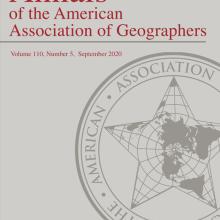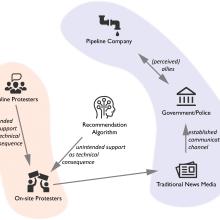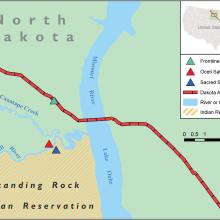This article examines an online protest to develop a contextual interpretation of geospatial big data and to challenge the debates on post-truth. In 2016, in support of the local protests against a crude oil pipeline passing through the region, social media users around the world remotely checked in to the Standing Rock Indian Reservation in North Dakota using a technique that we call location spoofing. This collective action thus generated a massive volume of inconsistent locational data that could easily be treated as fake information. Our contextual approach, integrating anthropological methodology, interprets user-generated big data as digital traces of human activities in the broader social–technological network of the involved human and nonhuman actors. This study reveals that the online protesters’ use of location-based features and content recommendation algorithm challenged not only the political and technological authorities but also, at a more profound level, the established ways for determining what is true and who gets to decide what is true for what purpose. We argue that this case of decentralized data generation and dissemination demonstrates an ongoing reconfiguration of the previously established regime of truth that has been monopolized by scientists or politicians. Our unique contextual approach to data interpretation is a pioneering effort to update epistemological assumptions about truth in today’s data-intensive environments. We call on scholars from geography, GIScience, and other disciplines to collectively envision an epistemological shift in our continuous pursuit of knowledge and truth in the so-called post-truth era.
Stand with# StandingRock: Envisioning an Epistemological Shift in Understanding Geospatial Big Data in the “Post-truth” Era
Zhang, S., Zhao, B., Tian, Y., & Chen, S. (2020). Stand with# StandingRock: Envisioning an Epistemological Shift in Understanding Geospatial Big Data in the “Post-truth” Era. Annals of the American Association of Geographers, 1-21.


